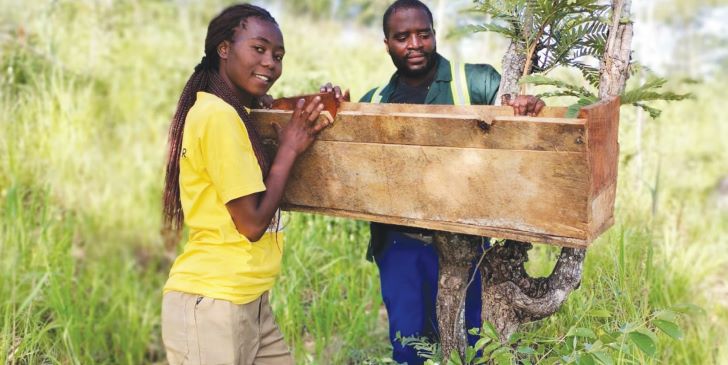Roselyn Kasunda; Agribusiness farmer, agropreneur
Roselyn Kasunda is one of few women inspiring people in agriculture and food production in Malawi.
While many people, including women, are now going into farming as a full time job and pushing forward in agriculture sector, she is becoming a bigger part of the industry.

Roselyn is making big strides in contributing to the country’s economy and creating job opportunities for people surrounding her.
She is an agropreneur who graduated from the Lilongwe University of Agriculture and Natural Resources (Luanar) University in 2018.
She is an agriculturist, but fully into farming with beekeeping as her main focus. She is also into horticultural crops and poultry as she keeps local chickens and goats.
Roselyn’s company is Peculiar Honeybee and Services (Pehops), a registered commercial honey bee farm located at Mitundu Trading Centre in Lilongwe.
The company was established on November 25 2017 when she was in her third year at Luanar.
She started with 10 beehives which cost her MK80 250 through her savings at school.
It has not been an easy road for the young farmer because there were people who pulled her back by claiming a woman can’t manage this kind of farming as it is too involving and dangerous.
“Pehops specialises in services that include production and packaging honey, constructing and supplying beehives; installing beehives and harvesting honey when hired. We also offer beekeeping training and consultation.
‘’The company also produces bee products such as wax and candles. Currently, the company intends to start producing honey soap, shoe polish, honey juice, lotion, lip bums and honeymilking slaves,” she said.
The company is a social enterprise which supports fighting against climate change, promoting involvement of women in business, social responsibility, job creation, poverty reduction and innovation.
Roselyn was inspired into business by her family background and different life challenges which gave her the passion to be independent.
‘’I developed a strong passion to bring positive change and a difference in my life and people around me. I always believe there is a better way of doing things.
‘’I have always wanted to do agribusiness because I had a vision to create jobs for myself and others. And also the entrepreneurial ideas were accelerated and developed through interaction with peers, my models and my knowledge from Luanar,” said Roselyn.
While at the university, she saw opportunities around her and started sourcing funds to venture into any kind of business with little financial resource.
Roselyn kept her faith to start small and grow with it because she had a lot of business ideas, but making a choice on which one to start with was a problem.
Thanks to Mr. A Kasumbu whom she met along the way and guided her.
“Kasumbu is a lead farmer of beekeeping based in Chakhuntha. I met him during a field training session I attended through St. Paul’s Agriculture Training Centre where I was doing an internship.
“I wanted to be like him. He was interested in my ideas and he promised to help me till I become a bee farmer,” she said.
Roselyn finally chose beekeeping to achieve her vision of creating jobs for others, fighting against climate through afforestation and because it is profitable.
Roselyn said the company is near Dzalanyama Forest where 10 percent of people burn charcoal to sustain their livelihood and, in the process, they end up clearing forests.
The young farmer disclosed that to alleviate this problem, Pehops is working with the community in beekeeping, training 302 people in bee keeping management.
They have given out 84 beehives to 18 groups as a startup as well as training them on how to make beehives with readily available resources, so that they can have more beehives at low cost of production.
She added that the socio-enterprise is also providing a market for their honey and bee products.
Pehops is also renting trees to the people in the community, especially from those who are not directly participating in beekeeping.
These trees are being rented to hang beehives for Pehops enterprise and for those who joined beekeeping, but do not have a place to install their beehives.
The owners of the trees are being paid K 2 000 per tree after honey harvesting, instead of them cutting down the trees.
“I want to start exporting honey at least 40 000 kg per year and would love to establish honey factories in all districts of Malawi, encouraging people to plant at least 5 000 trees. And in five years, my dream is to employ 35 graduates to be able to produce 80 000 kg of honey per year,” she said.
Her role models are Napoleon Dzombe, Simbi Phiri and Prophet Shepherd Bushiri who are well known entrepreneurs in Malawi and making a difference in peoples’ lives.
Since starting her agribusiness, Roselyn has achieved a lot not only in production, but also personal growth.
In 2019, she won funding worth 180 0000 from World University Service of Canada for being an outstanding young entrepreneur out of many young entrepreneurs who applied globally.
She said: ‘’Since 2018, It was just a plan that I should engage more people into bee farming, through bee farming training, mentorship and giving out the little resources I had. I am happy that I have been able to implement the plan now and I am working with 291 farmers of whom 195 are youths.
“I have 30 workers both seasonal and permanent and I managed to buy a two-tonne manual pick up car in 2021, which helps in my business. I am living my dream am setting up a new factory to be certified by the Malawi Bureau of Standards.
Roselyn also bought 12 acres of land and some plots.
She also travelled to South Africa, in April and then June 2022 when she was nominated by Farmers Union of Malawi, to undergo a young leadership incubation programme organised by the Southern African Confederation of Agriculture (Sacau).
In the same year, she travelled to Belgium and German under the same young leadership incubation programme for a study tour in which Sacau, Andeas Hermes Akademie (AHA), European Council of young Farmers (Ceja ) and Agrar Kontakt International (AKI) were involved.
She has pledged to reduce high rates of youth’s unemployment levels in Malawi through expansion of bee farming enterprises as a honey company to accommodate the youth, empower them in agribusiness as well as improving living standards through self-economic reliance.
Roselyn believes that as a young person, she is challenged to create the future she wants through hard work, networking, collaboration, determination and empowerment.
She is optimistic about the future and sees a lot being achieved in the near future.
Although bee farming is a risky venture, she finds potential to achieve her goals while conserving the environment which is one aspect she would like to champion.
In the near future she wants to see her honey bee farm grow and produce for the country not only for the local market in Mitundu, but for the domestic market as well as for export or international market potential.
“I am always geared to face challenges and provide possible solutions. Being a young female entrepreneur, I faced a lot of criticism, looked down upon because of my age and gender.
“Having a purpose and the fact that I wrote my vision gives me the energy to do more and stay focused to get results within a time frame. Farming is working for me and I am always geared to do more,’’ said the young farmer.
Roselyn is driven by positive perception as she is able to harvest honey which has health benefits.
Her advice to women is to be passionate about their goals and always think about the impact on the environment, social and economical and to make a difference in people’s lives.
‘’For the graduates, gone are those days when you graduate and you go directly to work. There are many graduates in Malawi and they should be innovative with the little resources you have to alleviate high unemployment rate.”
The hardest decision she ever made was to leave her comfortable job and start farming which she wasn’t sure it would be successful.
Born on March 4 1996, the farmer supports her parents and siblings through her business which has led her to be disciplined with finances.
In her free time she loves to walk and appreciate nature.





